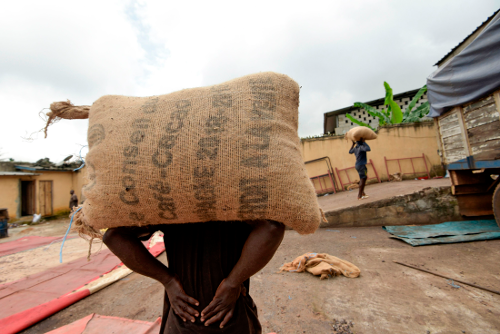Cocoa prices slump 27% in two days over increased rainfall, output

TLDR
- Increased cocoa supplies from Nigeria and improved rainfall lead to moderation in cocoa prices.
- Nigeria's March cocoa exports rose by 19% year-on-year, impacting cocoa active contracts which dropped over 20% in just two days.
- Decline in cocoa prices coincides with increased rainfall in West Africa, easing concerns about crop shortages in the upcoming year.
The moderation in cocoa prices, driven by increased supplies from Nigeria and improved rainfall, has provided some relief to the market after recent record highs. Nigeria's March cocoa exports, which rose by 19% year-on-year, contributed to the increased supplies.
As a result, cocoa active contracts dropped by more than a fifth of their value in just two days, settling at $7,500 a ton in the US. The decline in cocoa prices coincided with the onset of rainfall in West Africa, a key cocoa-producing region, which alleviated concerns about crop shortages in the coming year.
Earlier in the year, cocoa prices had soared to record highs of $11,800 per ton due to supply shortages and lower yields attributed to various factors such as unpredictable weather, tree illnesses, and inadequate investment in the sector.
Key Takeaways
The cocoa industry is facing significant challenges this year, with forecasts indicating subpar harvests in key producing countries like Ivory Coast. Recent data shows a considerable decline in cocoa shipments from Ivory Coast ports compared to the previous year, reflecting a 30% decrease in cocoa exports. Ecom forecasts that Ivory Coast's cocoa production for the 2023–24 season will drop by 21.5% year-on-year to 1.75 million metric tons, marking an 8-year low. Several factors contribute to this decline, including unfavorable growing conditions and the prevalence of crop diseases on West African cocoa farms. These challenges have significantly impacted cocoa production, leading to a surge in cocoa prices. While the recent moderation in prices may provide temporary relief to buyers, the cocoa market remains susceptible to fluctuations in supply and demand dynamics, as well as external factors such as weather patterns and geopolitical developments.

Next Frontier
Stay up to date on major news and events in African markets. Delivered weekly.
Pulse54
UDeep-dives into what’s old and new in Africa’s investment landscape. Delivered twice monthly.
Events
Sign up to stay informed about our regular webinars, product launches, and exhibitions.




